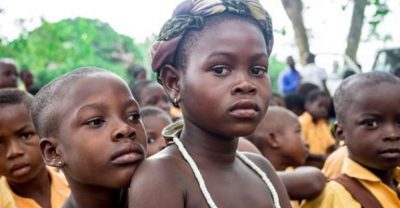Discrimination and violence against young women, as well as human rights abuses, still occur. Violence against girls is prevalent in too many parts of
Discrimination and violence against young women, as well as human rights abuses, still occur. Violence against girls is prevalent in too many parts of the world. Millions are forced into marriage at a very young age, and millions are deprived of their right to education; millions are victims of human trafficking and face all kinds of discrimination because they are female. Domestic violence often goes unreported or unpunished because family members think it is their right to discipline their children according to local traditions. We must, however, ensure that the rights of young girls are protected and enforced irrespective of the circumstance.
Globally one in three women (around 736 million)aged 15–49 has been beaten, coerced into sex or otherwise abused in her lifetime. Enforced by tradition and culture, such abuse cuts across all socio-economic classes and impedes achieving gender equality. 56.0% of women aged 20–24 have experienced child marriage (< 18 years), according to a study of 6,214 women in 34 sub-Saharan Africa countries. Child marriage often leads to early pregnancy and social exclusion: it limits girls' opportunities. It can result in school dropout, serious health risks for girls and their babies, domestic violence and poverty. Some 200 million girls have undergone female genital mutilation (FMG) — about twice as many as estimated in 2012 . The cost of treating the health consequences of FGM in 27 countries with exceptionally high rates is $1.4 billion each year. In many nations where both FGM and child marriage are common, particularly in Africa, specific characteristics are shared by those most vulnerable to each one, such as low levels of education, rural residency, and residence in poorer households. This harmful practice has no health benefits and can cause life-long physical, psychological and social problems for women who experience it. Moreover, in many countries such as Gambia and Sudan, girls are forced to get their husbands' permission before accessing healthcare, even for emergencies during pregnancy or labour, simply because they are not considered adults according to law or custom. Violence affects not only their physical integrity but also their psychological well-being, their health and safety. It is a sad fact that despite much progress made during past decades to change stereotypes about the roles of women and men, negative attitudes are too often perpetuated. Some people still try to control young girls' sexualities by forcing them into marriage or mutating parts of their bodies. Young women and girls face enormous challenges every day, and the international community owes it to them to give them a safe space to dream. Young people's voices must be heard so they can be part of finding solutions at local, national and global levels. Individuals, organizations and governments have a crucial role in providing comprehensive health care to women who have been victims of abuse and as an entry point for referring women to other support services they may require. With the support and efforts of UN agencies, initiatives such as UNFPA Ghana's Orange Support Centre is making significant strides in providing access for young women to sexual reproductive health services. The Orange Support Centre is a one-stop-shop for survivors of sexual and gender-based violence against women and girls who require assistance in establishing a secure path forward. This includes timely psychosocial support and access to legal services if needed; it also ensures that referrals can be given out right away where emergency shelters are required to receive assistance without delay! The International Day of the Girl Child is an opportunity to recognize that discrimination and violence against young women and human rights abuses still occur. We must make sure they get no less than what has been promised by international laws, which guarantee them all; education; protection; employment; participation, property rights. They need to be appreciated and fully supported through capacity building wherever possible so they can stand on their own feet when old enough. There’s a lot of work to be done, especially in poor areas where some of this prejudice and mistreatment is caused by economic obstacles. We must work to end all forms of discrimination based on gender, and it starts in our own homes and communities. _____ #DayofTheGirl #ForTheGoodOfGhana #EmpoweringAdolescentGirls #ENDChildMarriage #unwomen

COMMENTS